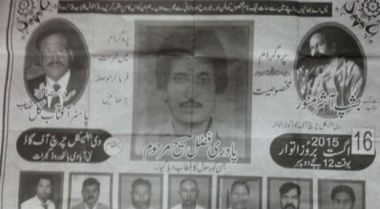15 Pakistani Christians arrested over flyer that gave deceased pastor title of 'apostle'

Fifteen Christians have been arrested, detained and slapped with blasphemy charges by Pakistani police in Gujarat province for publishing a flier that described a deceased pastor as one "who was given the title of an apostle."
According to World Watch Monitor, which reports on Christians facing persecution for their faith, the word "apostle" is "rasool" in the Urdu Bible. While the title "prophet" is usually translated into Urdu by the Arabic-root "nabi," "rasool" can also have the same meaning.
The claim of "apostleship" or "prophet-hood" is interpreted as a direct insult to Muhammad, the Prophet of Islam, as Muslims believe he is Allah's last and final apostle and prophet. Anything that counters the claim is considered blasphemy, which under Pakistani law, is punishable by death.
Last month, Pakistan Prime Minister Nawaz Sharif approved a legislation prohibiting the English translation of Islamic terms including sacred Arabic names and words like "allah," "masjid," "sala'at" or "rasool," which mean "God," "mosque," "prayer" and "prophet," respectively, the Catholic news agency Fides reported.
The flier was an invitation to Christians to participate in a memorial ceremony on Aug. 16 for the late Pastor Fazal Masih. It had photos of 15 office-bearers of the "Biblical Church of God," a Protestant group working in Gujarat.
"The flier's language looks like it's been copied from the Internet. It's language that may be more acceptable in countries where Christianity has more freedom. It suggests that the late pastor practiced the gifts of the Holy Spirit and had a prophetic gift. However this is a concept that does not translate easily in an Islamic context," said a Pakistani commentator.
The flyers were placed in areas in the city where many Christians live, including in Mughal Colony, the place where Younatan Fazal Gill, the deceased pastor's son and one of the programme organisers, live.
"There are about 200 households of Christians who have reasonable means of earning, and also have their own houses," said Mukhtar Mughal Khan, a Christian political leader and former local councilor.
Three days before the programme, a Muslim woman and a shopkeeper noticed that the flier used the word "apostle" for a Christian.
The shopkeeper reportedly inquired from Younatan's brother-in-law, Imran Masih, about the title "apostle." As a reply, Imran told him that Christians could use this "biblical" description, resulting in the escalation of the situation.
Last Aug. 15, it was announced through a loudspeaker of a local mosque that Muslims should gather to discuss the issue and the police were called in.
After the meeting, the police searched Christian neighbourhoods and removed the fliers. When organisers of the programme were preparing the next day, Pakistani police arrested some of them.
The police registered the cases under the Anti-Terrorism Act of 2001.
"The situation got tense, even though there was no untoward incident, so Christians started to leave the area," said Khan.
On Aug. 21, Khan said, women and children were sent away after Christians believed that extremist Muslims would attack their houses. There are about 500 houses in Mughal Colony including 200 households who are Christians.
The police cordoned off the area to prevent such an attack.
"However, the police arrested Pastor Aftab Gill, another son of the deceased pastor, and three others, while Younatan has obtained bail," said Khan.
Last year, Naja Masih, a Christian resident, was charged with blasphemy and turned over to the police after having a discussion with a neighbour allegedly about the similarities of the Bible and Quran.











